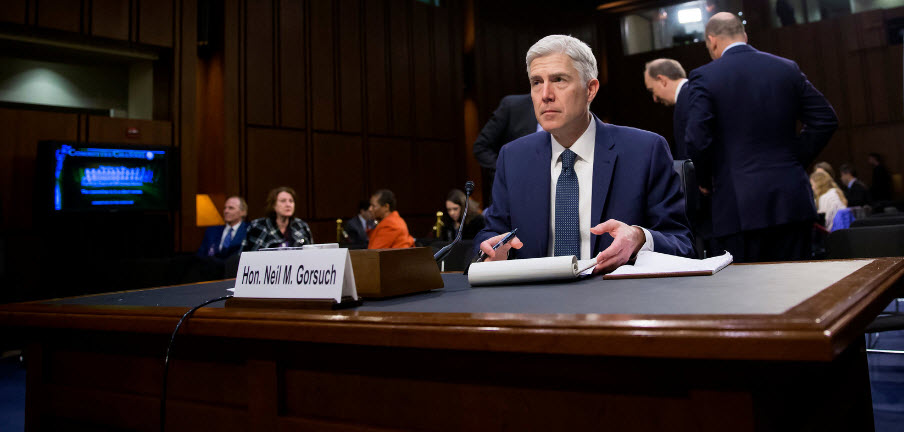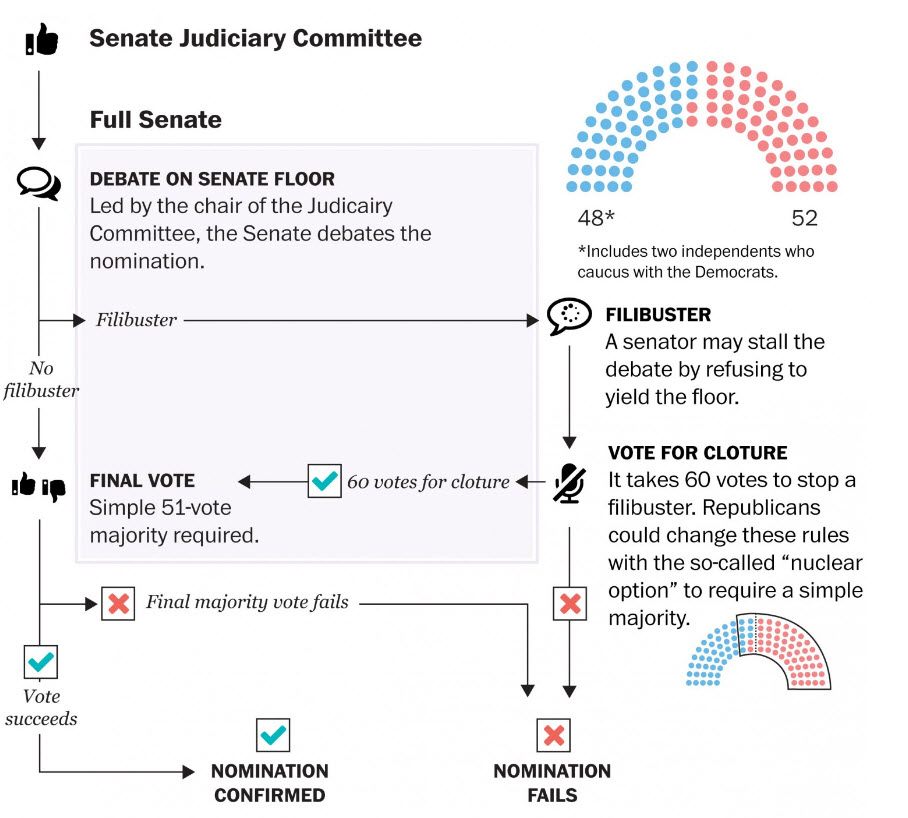 Senate Majority Leader Mitch McConnell has said this week that, by Friday, Judge Neil Gorsuch will be confirmed as a SCOTUS jurist to replace Antonin Scalia, who died a little over a year ago on February 13th of 2016 at the age of 79 whilst vacationing at a West Texas ranch.
Senate Majority Leader Mitch McConnell has said this week that, by Friday, Judge Neil Gorsuch will be confirmed as a SCOTUS jurist to replace Antonin Scalia, who died a little over a year ago on February 13th of 2016 at the age of 79 whilst vacationing at a West Texas ranch.
First up, from the WSJ.com:
Next Up Thursday: Cloture Vote and Rule Change
The Senate is on the verge of a major rules change sparked by Judge Neil Gorsuch’s nomination to be a Supreme Court justice, as Republicans and Democrats barrel toward a partisan showdown on the Senate floor over the future of the filibuster.
The first procedural vote on Judge Gorsuch, President Donald Trump’s nominee to a lifetime appointment on the Supreme Court, is expected Thursday morning—a vote where the GOP is expected to fall short. As a result, Senate Republicans are expected to use a procedural motion that would eliminate the filibuster for this and future Supreme Court nominations—expanding on changes that Democrats initiated in 2013.
What were the changes initiated in 2013 by then Senate Majority Leader Harry Reid? From the WSJ.com:
Reid, Democrats trigger ‘nuclear’ option; eliminate most filibusters on nominees
by Paul Kane
Senate Democrats took the dramatic step Thursday of eliminating filibusters for most nominations by presidents, a power play they said was necessary to fix a broken system but one that Republicans said will only rupture it further.
Democrats used a rare parliamentary move to change the rules so that federal judicial nominees and executive-office appointments can advance to confirmation votes by a simple majority of senators, rather than the 60-vote supermajority that has been the standard for nearly four decades.
The immediate rationale for the move was to allow the confirmation of three picks by President Obama to the U.S. Court of Appeals for the District of Columbia Circuit — the most recent examples of what Democrats have long considered unreasonably partisan obstruction by Republicans.
Confirmation of three US DCA picks to the DC Circuit.
In the long term, the rule change represents a substantial power shift in a chamber that for more than two centuries has prided itself on affording more rights to the minority party than any other legislative body in the world. Now, a president whose party holds the majority in the Senate is virtually assured of having his nominees approved, with far less opportunity for political obstruction.
Reid said the chamber “must evolve” beyond parliamentary roadblocks. “The American people believe the Senate is broken, and I believe the American people are right,” he said, adding: “It’s time to get the Senate working again.”
Translated: it’s best for my party and my party is in charge therefore that’s what we are going to do.
Republicans said the way Democrats upended the rules will result in fallout for years. “It’s another raw exercise of political power to permit the majority to do anything it wants whenever it wants to do it,” Sen. Lamar Alexander (Tenn.), the GOP’s parliamentary expert, told reporters.
Republicans vowed to reciprocate if they reclaim the majority.
Thank you. History, meet schadenfreude. Shake hands and come out fighting.
“Democrats won’t be in power in perpetuity,” said Sen. Richard C. Shelby (Ala.), a 27-year member. “This is a mistake — a big one for the long run. Maybe not for the short run. Short-term gains, but I think it changes the Senate tremendously in a bad way.”
Shelby was remarkably prescient.
From November 22nd, 2013.
Can anyone remotely say “goose and gander”? WSJ.com continues:
After the Senate Goes ‘Nuclear’ on Supreme Court Nominees, Will Legislation Be Next?
Republicans are expected Thursday to change the Senate’s rules to make it easier to confirm Supreme Court nominees. The move has aroused concern that legislation may be the next target.
The Senate, its occupants worry, is just one step away from acting a whole lot like the House if the party in the minority is no longer able to block legislation.
Right now, most bills need 60 votes to clear procedural hurdles in the Senate. Most of the time, Democrats and Republicans have to work together unless unless one party controls more than 60 seats in the chamber. Currently Republicans hold 52 seats. Both parties have tried to use the chamber’s procedural tools to their advantage, leading to more frequent standoffs.
Then Breitbart.com writes about the situation now.
Constitutional Option Unstoppable: John McCain and Lisa Murkowski Will Vote Yes
by Ken Klukowski
WASHINGTON,D.C.—Sens. John McCain (R-AZ) and Lisa Murkowski (R-AK) announced on the Senate floor Wednesday that they will not allow a filibuster of Neil Gorsuch, and will instead vote for the constitutional option to restore a simple-majority vote to confirm Supreme Court nominations, making that outcome now almost certain.
Really? And how will they manage to halt it?
Earlier during the day Senate Majority Leader Mitch McConnell (R-KY) claimed that he had the 50 votes he needs—plus Vice President Mike Pence as a tie-breaker, if needed—to invoke the constitutional option and confirm President Donald Trump’s first Supreme Court nominee.
With his towering stature in the party, both in seniority and later as the 2008 presidential nominee, McCain was seen by some as the de facto chairman of the Gang of 14 effort in 2005 to save the option of filibustering judicial nominees in the future — but allowing through many of President George W. Bush’s nominees that were then being blocked by a Democratic filibuster. Ironically, that strategy’s architect was none other than Sen. Chuck Schumer (D-NY), who implemented it in 2003.
Do you see this? Do you see the wheels within wheels? On the other hand, this is McCain serving McCain and, simultaneously when it pleases him, doing the work of the GOP.
“The unprecedented nature of the Democrats’ filibuster of a Supreme Court nominee has left me in a difficult position,” the Arizona senator lamented on the state of affairs in 2017, and after surveying years of past practice in Senate confirmations.
“I’m left with no choice,” McCain declared. “I will vote to change the rules to allow Judge Gorsuch to be confirmed by a simple majority.”
The Nuclear Option. What is it?
That said, what is cloture?
“What if the Republicans become the majority again?” Inside baseball, but very important. Full circle. Should be no shock to anyone. But, zounds, a major shock to the Demorats who hadn’t fully anticipated that the Republicans — heretofore unpossessed of a spine — actually grew a modicum of one under a president who coiffed an orange dead cat on top of his head.
Again, more on the “nuclear option.”
Trent Lott coined the term. But here is a graphic.
 The Senate Judiciary Committee has already approved Judge Neil Gorsuch.
The Senate Judiciary Committee has already approved Judge Neil Gorsuch.
One thing that I simply cannot understand. Please, someone attempt to explain to me, obviously, the advantage acquired by the Demorats in the filibustering of Judge Gorsuch. Because, once changed, the rule will allow the GOP to acquire another potential SCOTUS nominee during this term or another subsequent.
I have information to indicate there may likely be another SCOTUS vacancy extant somewhere in 2017. Then, between 2017 and 2020, my guess is that there will likely be another SCOTUS vacancy. That’s three.
By forcing a filibuster the Demorats will have, potentially, enabled the next three SCOTUS replacements. With luck they won’t be Left-leaning. This could be an unprecedented achievement in all of US history.
All under President Donald Trump.
Three Demorat Senators have had the guts to take a stand.
With 52 Republicans and 48 Democrats in the Senate, the GOP needs eight Democrats to join them to break a filibuster, which takes 60 votes.
So far, however, only three Democrats have come out saying they would support Gorsuch – Sens. Joe Manchin of West Virginia, Heidi Heitkamp of North Dakota and Joe Donnelly of Indiana.
Who and what? Time will tell. These are my thoughts.
BZ


